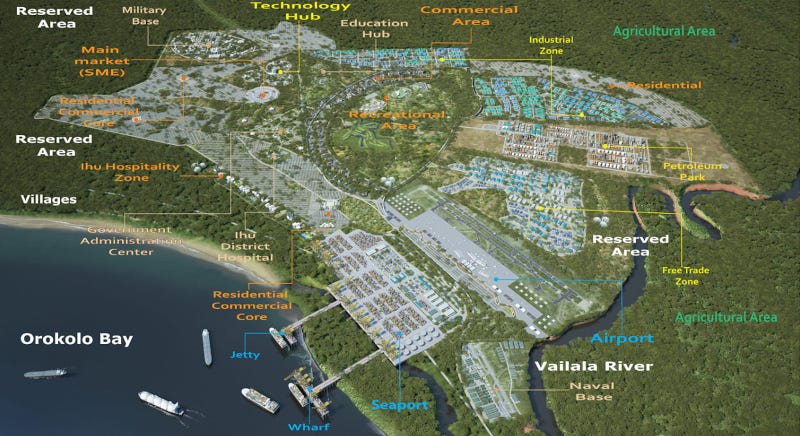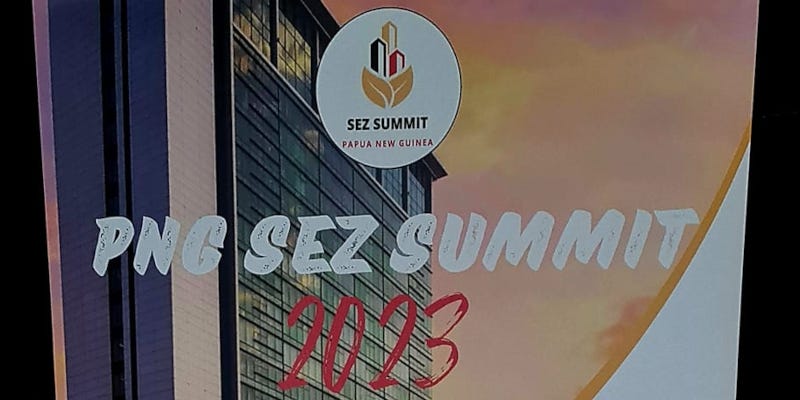The great resource grab: Special Economic Zones in Papua New Guinea
“Popular as they are, SEZs are often flops.”
Today is the second day of the Special Economic Zone Summit 2023 in Papua New Guinea. It’s being held in Port Moresby’s Stanley Hotel, which is owned by Rimbunan Hijau, one of the most destructive logging companies operating in the country.
To mark the event, the PNG Environmental Alliance has put out a statement asking whether Special Economic Zones represent economic development or a resource grab. The statement is available in full below.
First, a quick look at the record of Special Economic Zones in the Global South, followed by a look at the proposed development of SEZs in Papua New Guinea.
Special Economic Zones in the Global South
In 2017, the World Bank carried out a review of Special Economic Zones as an instrument to promote economic development.
The Bank notes that, “whether SEZs have achieved their objectives is unclear”. The majority of research tends to focus on success stories, which raises questions about whether SEZ successes can be replicated in different economic, social, political, and legal contexts. “Replicating policy and incentive models involves significant risk,” the Bank writes.
The Bank concludes that,
Generally, large zones in relatively poor areas that are not too far from the largest city, in countries with previous histories of industrialization, and with relatively easy access to developed country markets have performed best.
And in 2015, The Economist titled its report on SEZs, “Not so special”. While SEZs may be popular with politicians, economists are less convinced:
[T]he craze for SEZs suggests that governments too often see them as an easy win: make an announcement, set aside some land, offer tax breaks, and—hey presto!—deprived regions or struggling industries are healed. If only it were that easy. Popular as they are, SEZs are often flops. Africa is littered with white elephants. India has hundreds that failed to get going, including more than 60 in Maharashtra state alone in just the past few years.
Special Economic Zones in PNG
The Japanese Development Institute, a think tank that promotes neoliberal globalisation, is working on a Special Economic Zone Master Plan for Papua New Guinea. Shoichi Kobayashi, Chairman and Chief Executive Officer of the JDI, gave a presentation at the SEZ Summit in Port Moresby in which he stated that the PNG government’s attempts to establish SEZs in the country had so far failed because of the lack of proper regulatory framework.
He listed the following industries as being suitable for SEZs in PNG: palm oil, cassava, sugar, rice, woodchips/paper and pulp, processing of lumber, integrated livestock with feeds, fishery processing manufacturing and LNG processing. The list suggests that SEZs in PNG will be focussed far more on a resource grab than on economic development.

The Ihu Special Economic Zone is more than 250 kilometres from Port Moresby. This US$6 billion project would cover an area of 85,000 hectares of was is currently almost entirely forested land. In addition to a free trade zone, the Ihu SEZ would include a technology hub, an industrial zone, a commercial area, a port, an airport, a hospital, a naval base, and a military base.
A major driver of the Ihu Special Economic Zone is the Elk-Antelope gas field owned by TotalEnergies, Exxon Mobil, Kumul Petroleum Holdings, and Santos. A pipeline from the Elk-Antelope gas field was pass through the Ihu SEZ, which would include a large petroleum park.
Timber processing would also be an important activity in the Ihu SEZ. Peter KenGemar, the main proponent of the project, claims that,
“The value of the timber project in Kikori is logs, and now they are exporting as logs. The remaining timber resource is US$6 billion. By 2025, the government intends to stop all round log exports. When they stop and go to downstream processing, you can triple or quadruple the value of the timber resource and it will go up to over US$20 billion in Kikori.”
As the PNGi investigative website points out, KenGemar’s US$6 billion figure is almost seven times the value of the timber harvested in the whole of Gulf Province over the last 27 years!
The project developer of the Ihu Special Economic Zone is a private company which, as PNGi notes, has “no identifiable record for transparency, accountability or good governance”.
Here’s the PNG Environmental Alliance’s media statement about SEZs in Papua New Guinea. It was published in the Post Courier on 8 May 2023.
GIVING AWAY PNG
SPECIAL ECONOMIC ZONES: ECONOMIC DEVELOPMENT OR RESOURCE GRAB?
The PNG Environmental Alliance, a representative of Civil Society Organisations in Papua New Guinea is deeply concerned about the national government’s push to implement the Special Economic Zone concept throughout Papua New Guinea. In particular, we are concerned about the impact of the Special Economic Zone Authority Act 2019 (SEZAA 2019) on environmentally important areas and the well-being of the communities within and adjacent to planned SEZs. PNGEA foresees an increased demand for land and seascape, which will subsequently be alienated from its customary owners.
We consider the SEZ Authority Act does not require adequate consultation with communities before SEZs are established. The Act does not necessitate Free, Prior, and Informed Consent (FPIC) before a project is approved. Doing awareness and consultation, and going through a full FPIC process in a culturally appropriate manner should be mandatory. Given the scale of the projects involved and the changes to the livelihoods of the communities affected, the lack of a necessitation of FPIC is very worrying.
We also note with concern Section 42(m), which states that the degree of compliance with environmental laws will be considered in the authorising of an SEZ. In our opinion, this wording is not strong enough and is at risk of undermining the integrity of the government’s environmental protection policies. We further note Section 64 discusses environmental responsibility which is why full compliance with environmental laws should be expected. These important safeguards are necessary to ensure that SEZs are developed in a responsible and sustainable manner. However, the Act is also silent on a clear pathway to enhance the protection of existing biological diversity and conservation efforts.
The language of the SEZAA 2019 provides for the Authority to take lead in the implementation of respective environmental, labour and other relevant national laws and regulations. As a direct consequence, it undermines the existing legal regime in discharging its mandate. We would also question the abilities of the Authority, which is designed to progress the nation’s economic concerns, to competently assume environmental stewardship.
The land acquisition process set out by Section 52 of the Act may constitute an unjust process for the Authority to acquire land and alienate customary land for commercial purposes; the language of the SEZAA 2019 speaks to compensation packages but is not clear as to what form it will take and if it involves large tracts of land, there will be challenges of loss of resources, displacement, relocation and loss of livelihood for customary landowners which will be significant and inevitable. Coupled with this is the difficulty in seeking legal redress for impacted communities over ownership of land – a possible breach of the fundamental right where everyone has a right to the full protection of the law enshrined in the PNG Constitution.
We consider the Special Economic Zones will only benefit larger companies. Schedule 2 of the Act provides for a minimum investment requirement for investors seeking to operate in the SEZ which is set at AUD 10 million. The minimum investment required is a considerable amount, which will make it prohibitive for many local small businesses to access the SEZ. This is of particular concern in relation to agriculture. If smaller, and often more sustainable, agricultural businesses are forced out by the tax benefits accrued by richer competition, this exposes Papua New Guinea’s biodiversity-rich environment to the dangers of large-scale agriculture. Such a development would also be contradicting the government’s policies and programs to promote local SME’s.
The PNGEA believes that economic development is important for Papua New Guinea's future; however, this must be achieved in a sustainable and responsible way that respects the rights and interests of local communities and protects our natural environment. The customary land system of Papua New Guinea is unique and brings an identity and pride to the nation. However, the SEZAA 2019 risks wounding this essential part of our Melanesian conscience. The focus is on using SEZs to again attract foreign companies. We urge the Papua New Guinea Government to not just take action to halt the establishment of SEZs in environmentally sensitive areas, but to require robust environmental impact assessments and meaningful consultation with affected communities before any SEZs are approved.
More so, the upcoming two (2) days’ SEZ Summit organized by the Government of Papua New Guinea, through the Ministry of International Trade and Investment, is seen by PNGEA members as a platform to propel the concept of SEZ at the national level, without conducting proper awareness of this borrowed agenda to the vast population of this country, thorough regional consultation processes. The current registration fee of PGK1500/participant limits the attendance of community stakeholders who will be the most affected.
It is the view of the PNGEA that the SEZAA 2019 is not consistent with the Government’s environmental commitments made at international climate forums, and that by promoting the establishment of SEZs under this Act, the PNG Government has derailed off course to Take Back PNG, as implementation of the SEZAA 2019 will mean the Marape-Rosso Government will be GIVING AWAY PNG!
Therefore, the PNG Environmental Alliance, as a representative of Civil Society Organisations in Papua New Guinea, strongly urge the PNG Government to reconsider its decision on implementation of SEZs as outlined below:
The PNG Government must be consistent, fair and equitable by adhering and complying with its existing laws and policies on environmental and social protection in order to sustain the natural and social resources of this country for future generations.
All business investors must be treated equitably and fairly with no investor having special considerations.
Close attention must be paid to the environmental and social impact of SEZs. This should include, but not be limited to, mandatory environmental and socio-economic impact assessments and the assurance that CEPA’s authority and that of other relevant government bodies is not superseded.
The PNG Government must continue its focus on promoting local SME’s and empowering our people, and avoid the risk of them becoming mere spectators and losing their autonomy by foreign owned companies operating on their land and using their resources.
Let us work together to create a sustainable future for our nation, one that values the protection of our natural resources and respects the rights and well-being of its entire people.
Authorised on behalf of the PNG Environmental Alliance membership
5th May 2023
Pamela Avusi
Coordinator
PNG Environmental AllianceBismarck Ramu Group (BRG)
Centre for Environmental Law & Community Rights (CELCOR)
Consultative Implementation & Monitoring Council (CIMC)
FORCERT – Forests for Certain: Forests for Life!
Institute of National Affairs (INA)
Partners with Melanesians (PwM)
Research & Conservation Foundation (RCF)
Tenkile Conservation Alliance (TCA)
Tree Kangaroo Conservation Program (TKCP)
Wide Bay Conservation Association (WBCA)







Well, that's exactly the point of making "Special Economic Zones" - to get around all the common obstacles to big profits, such as environmental rules and assessments, labour rights, taxes, etc. The object of Business is to privatize profits while socializing expenses. A good government which supports Business will act like the Lord Mayor of London, whose Duty is to "open doors for business at all levels." And why do many business parks fail? They fail to include all the necessary sub-trades that support the main business activities. And with high entrance requirements, this outcome is guaranteed. And an SEZ that is just exporting is simply a no-rules port facility.